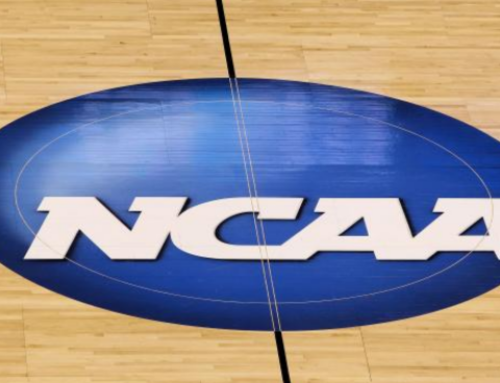The parent and coach relationship can be tenuous at best. Some parents are extremely demanding and overbearing, and coaches may not be giving you or your kid what you want.
Are coaches always right? Absolutely not. But there’s no need to make a bad situation worse. Newsflash: You’re not always right either.
Too often, this dynamic creates a recipe for disaster. A fractured parent-coach relationship causes unnecessary tension and drama around the team. It may ultimately end up hurting your young athlete’s performance and love for his or her sport.
We asked Dr. Chris Stankovich, a sport psychologist and founder of Advanced Performance Systems, what things parents should never say to their kid’s coach. Avoid these mistakes and you may foster a more constructive relationship with your child and his or her coach.
Mistake 1: Asking about playing time the wrong way
You think your kid is the greatest athlete in the world. And seeing him or her sitting on the bench can be frustrating. We get it. It’s the root of many parent-coach conflicts.
Coaches dread this conversation more than anything. It typically goes something like this:
“Why is my kid not getting more playing time? He’s much better than that other athlete.”
“No, actually he’s not. I’m doing what’s best for the team.”
Then all hell breaks loose.
According to Dr. Stankovich, it’s OK for parents to talk to coaches about playing time, but only if it’s done tactfully and with respect. “It’s responsible parenting to have a dialogue with the coach about playing time,” he says. “Coaches owe that to parents.”
Instead of comparing your athlete to another, the conversation should focus on what your young athlete can do to improve his or her chances for more playing more. “It’s important that you’re not demanding, belligerent or disrespectful,” he advises. “I would stop pointing fingers. Only seek information that you can use to work on with your child.”
RELATED: Signs That You’re a Horrible Sports Parent
Mistake 2: Telling the coach how to coach
There’s a good chance you have thoughts and opinions about the coach’s strategies and tactics, especially if you played the sport at some point in your life.
But remember, you are not the coach. If the coach doesn’t ask for your advice, he or she probably doesn’t want or need it.
“This happens a lot, especially if the parents played college or pro sports. They sometimes feel like they know a little bit more than the coach,” says Stankovich. “Sometimes they do. But it’s important to respect that boundary and not try to coach the coach.”
If you have something constructive to offer based on your experience, ask the coach before the season starts if he or she would be receptive to hearing about it. If you don’t have experience, stay out of the mix.
Mistake 3: Asking about being involved too often
Getting involved with your kid’s team is great. Being too involved and for the wrong reasons can be overwhelming.
“I think it’s perfectly fine and encouraged for a parent to ask if there’s anything they can do to help the program,” says Stankovich. “That might be fundraising, being a booster or creating a social media campaign.” However, he cautions, “I just wouldn’t be pushy about any of those things. Ask if the coach needs help and leave it at that. Don’t push it every other day or else you become a burden.”
Helping out just to get your kid more playing time is also ill advised. You’d hate to have a favoritism situation hurt your kid, so don’t create a favoritism situation that helps your kid and hurts someone else’s.
Mistake 4: Trying to talk to the coach too close to the game
This isn’t necessarily about what you might want to say to the coach. It’s more about your timing.
Even if you have the best intentions, Stankovich advises avoiding talking with the coach about serious matters right before, during or after a game. This is when coaches do what they do best—coaching! If you start badgering the coach, you might disrupt his or her normal preparation and cause an unnecessary distraction. The last thing you want is for the coach to resent your presence.
RELATED: 10 Ways You’re Embarrassing Your Kids at Their Sporting Event
RECOMMENDED FOR YOU
MOST POPULAR
The parent and coach relationship can be tenuous at best. Some parents are extremely demanding and overbearing, and coaches may not be giving you or your kid what you want.
Are coaches always right? Absolutely not. But there’s no need to make a bad situation worse. Newsflash: You’re not always right either.
Too often, this dynamic creates a recipe for disaster. A fractured parent-coach relationship causes unnecessary tension and drama around the team. It may ultimately end up hurting your young athlete’s performance and love for his or her sport.
We asked Dr. Chris Stankovich, a sport psychologist and founder of Advanced Performance Systems, what things parents should never say to their kid’s coach. Avoid these mistakes and you may foster a more constructive relationship with your child and his or her coach.
Mistake 1: Asking about playing time the wrong way
You think your kid is the greatest athlete in the world. And seeing him or her sitting on the bench can be frustrating. We get it. It’s the root of many parent-coach conflicts.
Coaches dread this conversation more than anything. It typically goes something like this:
“Why is my kid not getting more playing time? He’s much better than that other athlete.”
“No, actually he’s not. I’m doing what’s best for the team.”
Then all hell breaks loose.
According to Dr. Stankovich, it’s OK for parents to talk to coaches about playing time, but only if it’s done tactfully and with respect. “It’s responsible parenting to have a dialogue with the coach about playing time,” he says. “Coaches owe that to parents.”
Instead of comparing your athlete to another, the conversation should focus on what your young athlete can do to improve his or her chances for more playing more. “It’s important that you’re not demanding, belligerent or disrespectful,” he advises. “I would stop pointing fingers. Only seek information that you can use to work on with your child.”
RELATED: Signs That You’re a Horrible Sports Parent
Mistake 2: Telling the coach how to coach
There’s a good chance you have thoughts and opinions about the coach’s strategies and tactics, especially if you played the sport at some point in your life.
But remember, you are not the coach. If the coach doesn’t ask for your advice, he or she probably doesn’t want or need it.
“This happens a lot, especially if the parents played college or pro sports. They sometimes feel like they know a little bit more than the coach,” says Stankovich. “Sometimes they do. But it’s important to respect that boundary and not try to coach the coach.”
If you have something constructive to offer based on your experience, ask the coach before the season starts if he or she would be receptive to hearing about it. If you don’t have experience, stay out of the mix.
Mistake 3: Asking about being involved too often
Getting involved with your kid’s team is great. Being too involved and for the wrong reasons can be overwhelming.
“I think it’s perfectly fine and encouraged for a parent to ask if there’s anything they can do to help the program,” says Stankovich. “That might be fundraising, being a booster or creating a social media campaign.” However, he cautions, “I just wouldn’t be pushy about any of those things. Ask if the coach needs help and leave it at that. Don’t push it every other day or else you become a burden.”
Helping out just to get your kid more playing time is also ill advised. You’d hate to have a favoritism situation hurt your kid, so don’t create a favoritism situation that helps your kid and hurts someone else’s.
Mistake 4: Trying to talk to the coach too close to the game
This isn’t necessarily about what you might want to say to the coach. It’s more about your timing.
Even if you have the best intentions, Stankovich advises avoiding talking with the coach about serious matters right before, during or after a game. This is when coaches do what they do best—coaching! If you start badgering the coach, you might disrupt his or her normal preparation and cause an unnecessary distraction. The last thing you want is for the coach to resent your presence.
RELATED: 10 Ways You’re Embarrassing Your Kids at Their Sporting Event











